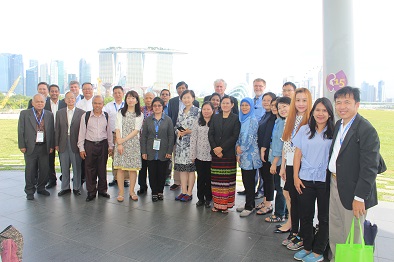Water crisis is one of the water issues in Asia, "In 2014, the total water consumption in China was 609.5 billion m3 which was 22.3% of the total water resources 2726.7billion m3. This data revealed water crisis in China" Ms. Xiong Ying, Technical Director from China Union Engineering Co.Ltd shared the Water Crisis in China, she took 2 cases from Xiamen University and Huaqiao University because water reuse in Chinese university is one of the effective measures dealing with water crisis.
In Japan, Water Cycle is a problem, in 2015 the Cabinet in Japan had a "Basic Plan on Water Cycle" with the key points to establish dedicated water cycle councils based on each river basin to draw up a comprehensive plan and to implement measures. While from Indonesia, Sanitation is the topic that shared in the workshop. They shared their Citywide sanitation strategy, is a strategic planning process for sanitation sector development. It includes the vision, missions, and goals of sanitation development.
One of the challenges of water supply in Phnom Penh, Cambodia are : Increasing urbanization into the city, growing population and burgeoning economic activities, impact from climate change and shortage domestic water supply in rural areas.
Looking at Dhaka cities, now cities have become the Hotspots for urban disasters due to demographic pressures and climate change. Climate change is also expectd to enhance flooding and threaten water security.
Learning from all experiences from the Asia, Dr. Seneshaw Tsegaye from University of South Florida summarized that to deal with all the problem in Asia, The water sector can’t do it alone, they have to cooperate with land planners, architects, developers, government officials, financiers and energy experts.
